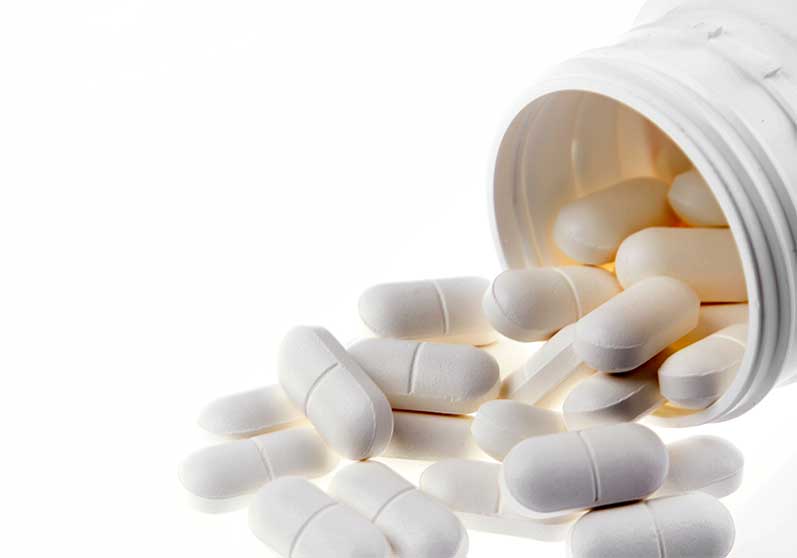Vicodin Dosage | Proper Use, Starting Dosage, & High Doses

Medically Reviewed By: Manish Mishra, MBBS

Written by: Dr Jason Martin Psy.D., LCPC
The dose of Vicodin prescribed to any individual varies depending on the amount of pain a person experiences, their physical characteristics, and if they have pre-existing opioid tolerance.

Vicodin dosage may be adjusted over time to provide the lowest dose of pain medication that effectively treats your symptoms.
Dosing instructions may also differ depending on the strength and formulation of the drug, which is available in both extended-release and immediate-release capsules, and a liquid oral elixir.
Hydrocodone is a strong semi-synthetic opiate/opioid painkiller prescribed in healthcare settings to treat moderate to severe pain, especially postoperative pain.
And while the brand name medications Vicodin, Vicodin ES, and Vicodin HP have been discontinued, a variety of similar generic formulations of hydrocodone bitartrate and acetaminophen are still widely used.
Because these combination products, still commonly but informally referred to as Vicodin, Norco, and Lortab, see such widespread use, they are also often diverted and abused recreationally.
Proper Vicodin Dosage
For adults, the recommended starting dose of Vicodin is 1-2 capsules, or 5-10 mg of hydrocodone and 300 or 600 mg of acetaminophen, every 4-6 hours as needed. The maximum daily dose for Vicodin is no more than 8 tablets per day.
For children, any use or dosage of hydrocodone/acetaminophen must be determined by the prescribing healthcare provider.
Potential Side Effects Of Vicodin
Common side effects of Vicodin may include:
- nausea
- vomiting
- constipation
- lightheadedness
- dizziness
- drowsiness
These side-effects will likely decrease with time as your body adjusts to the medication.
However, patients taking Vicodin should still consider increasing their dietary fiber to combat constipation and should take care when getting up from a lying or sitting position to avoid accidental falls.
Serious side effects and adverse reactions, including allergic reactions, fainting, seizures, slow or shallow breathing, and severe sedation may also sometimes occur. Seek immediate medical help if you experience severe or concerning reactions.
High Doses & The Risk Of Vicodin Overdose
Both hydrocodone and acetaminophen can be dangerous in high doses, especially when taken with other CNS depressants or acetaminophen-containing products.
Hydrocodone works by binding to opioid receptors in the central nervous system, slowing CNS activity and reducing feelings of pain and anxiety. Symptoms of hydrocodone/opioid overdose may include:
- blue colored fingernails and lips
- small, pinpoint pupils
- cold clammy skin
- gasping, gurgling, and other signs of respiratory depression
- nausea and vomiting
- becoming unresponsive
- confusion
- dizziness
- drowsiness
- seizures
- loss of coordination
- low blood pressure
In addition, over-ingestion of the acetaminophen portion of this medication may cause acetaminophen toxicity and delayed symptoms including convulsions, abdominal pain, and jaundice (yellowing skin and eyes) due to liver damage or liver failure.
These effects, particularly respiratory depression and liver failure, can be life-threatening without prompt treatment. If you suspect a Vicodin overdose has occurred immediately call 911, administer Narcan (naloxone) if available, and provide first-aid to the victim until help arrives
Potential Vicodin Drug Interactions
A variety of different over-the-counter and prescription drugs, supplements, and illicit substances may interact with hydrocodone and/or acetaminophen in more or less serious ways.
These potential interactions include:
- mixed opioid agonist/antagonist pain medications including butorphanol, nalbuphine, pentazocine, and naltrexone that may reduce the effect of Vicodin
- central nervous system (CNS) depressants like cannabis, sleeping pills, benzodiazepines, muscle relaxants, and alcohol
- opioid analgesics or cough medications (hydromorphone, oxycodone, codeine, oxycodone, tramadol, etc.)
- certain drugs or supplements that increase or decrease the metabolism and therefore the effect and length of effect of hydrocodone/acetaminophen, including rifampin, ritonavir, phenytoin, and others
- MAO inhibitors like isocarboxazid, linezolid, and others, which should not be used within fourteen days of Vicodin due to a risk of serious adverse effects
- various serotonergic drugs and supplements, including common antidepressants, which may cause a condition known as serotonin syndrome
This medication should also not be prescribed with caution to those with a history of head injury, liver disease, lung disease, substance abuse, acute bronchial asthma, paralytic ileus, drug hypersensitivities, and certain other conditions.
It may also cause infertility, negative effects related to pregnancy or breastfeeding, adrenal gland problems, and drug test results.
Vicodin Withdrawal
Prolonged use may also lead to physical dependence and Vicodin withdrawal symptoms upon discontinuation of the medication.
Withdrawal symptoms associated with opioids include intense drug cravings, nausea, and insomnia. Abruptly stopping use of Vicodin, and then taking a low or high dose to manage symptoms, can increase the risk of overdose.
Vicodin Addiction Treatment
Despite being a common option for routine outpatient pain management, Vicodin is a controlled substance and, if abused, can be dangerous and addictive.
However, if you or someone you love struggles with Vicodin abuse or addiction, help is available.
At Ohio Recovery Center we offer:
- medical detoxification
- inpatient rehabilitation services
- cognitive behavioral therapy
- dual diagnosis care for contributing mental health disorders
- medication-assisted treatment
- aftercare support
To learn more, please contact us today.
- Children’s Hospital of Pittsburgh — Acetaminophen Toxicity Symptoms & Treatment https://www.chp.edu/our-services/transplant/liver/education/liver-disease-states/acetaminophen-toxicity
- Food and Drug Administration (FDA) — Vicodin Label https://www.accessdata.fda.gov/drugsatfda_docs/label/2006/088058s027lbl.pdf
- National Library of Medicine: MedlinePlus — Hydrocodone Combination Products https://medlineplus.gov/druginfo/meds/a601006.html

